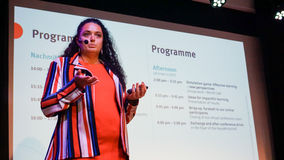


Impactful Learning: 25 Years and a Conference Full of Insights

RECAP OF THE CONFERENCE
common sense was founded in 1999, a time when the internet was still in its infancy, but the hype around online business models, which would later lead to the bursting of the dot-com bubble, was in full swing. At that time, the founders named the new company "common sense," which translates to "Gesunder Menschenverstand" in German. This was meant to express that it wasn’t about the hype or technology alone. The focus was intended to be on learning and its lasting impact — not on short-term impact, but on a sustainable impact that leads to change.


This is why effectiveness is an essential part of our company's philosophy and a fitting theme for our 25th anniversary conference. The keynote speech by guest speaker and learning expert Prof. Dr. Axel Koch offered inspiration and reflections on the question of what learning effectiveness means and provided the starting point for engaging with various specially prepared topics and personas to generate ideas and approaches for ensuring the effectiveness of digital learning solutions.
At the forefront of the event was collaborative activity. This “Together” spirit has been an essential characteristic of the common sense style since the company’s founding. common sense never wanted to be an agency where you hand over a course and get it back in digital form. Instead, we always work closely with our clients and partners, working together on equal footing. In this spirit, it was important to us not to simply present the topic of effectiveness but to work on it collectively with partners and clients during the anniversary specialist conference.


The results speak for themselves.
Together with our clients and partners, we were able to generate a wealth of ideas and sustainable solutions for the following scenarios:
Introduction to digital learning
How can effectiveness be achieved with people who do not (want to) see the point of a digital training offer?
Strategic consulting for organisational change
How can the effective introduction of a company-wide learning culture and corresponding digital learning initiatives succeed in an international and cross-cultural setting?
Learning in dynamic project environments
How can aspiring project managers be effectively trained through digital formats for capacity development projects abroad?
Onboarding in dynamic environments
How can effective onboarding be ensured in times of high staff turnover, irregular office attendance, and hybrid teams?
Conflicting expectations
How can learning initiatives be made fresher, more dynamic, and more modern to appeal to younger employees, without older, more experienced employees losing motivation, while ensuring measurable impact in the application of learning for both target groups?
Learning with limited infrastructure
How can effective learning take place in settings where there are no face-to-face learning opportunities, no practical ways to practise what has been learned, and where difficulties with the English language limit the use of content from the internet?

Keys to Long-Term Learning Success
The group work results on the above scenarios highlighted the following key factors for the effectiveness of digital learning:
-
Establishment of a learning culture in the organisation/company
-
Support and leadership by example from management
-
Clear communication of the learning goals
-
Providing clear learning objectives before the training begins
-
Combining digital and analog learning opportunities, tailored to objectives and settings
-
Relevant content tailored to the target group
-
Building trust in technology among learners
-
Exchange and communication as essential components of learning
-
Modular and flexible design of learning opportunities
-
Development of flexible and personalized learning paths
-
Wellbeing – fostering a positive learning environment
-
Integrating learning into daily work routines, making it a habit
-
Mentoring and buddy systems
-
Regular, small-step learning
-
Measuring learning outcomes
-
Using impact-oriented indicators
-
Ensuring knowledge transfer through target group-specific measures, e.g. regular knowledge checks, reports, etc.
-
Incentivising the practical application of learned skills
Many thanks to our clients and partners for the many innovative ideas, and to all technical helpers who made our conference multilingual through simultaneous interpretation.
Here’s to many more constructive years together! A heartfelt thank you to Aserbaidschan, Nigeria, Kenia, South Africa, Italy, Germany, Austria, Armenia, Indonesia, Sweden, Trinidad und Tobago.

























